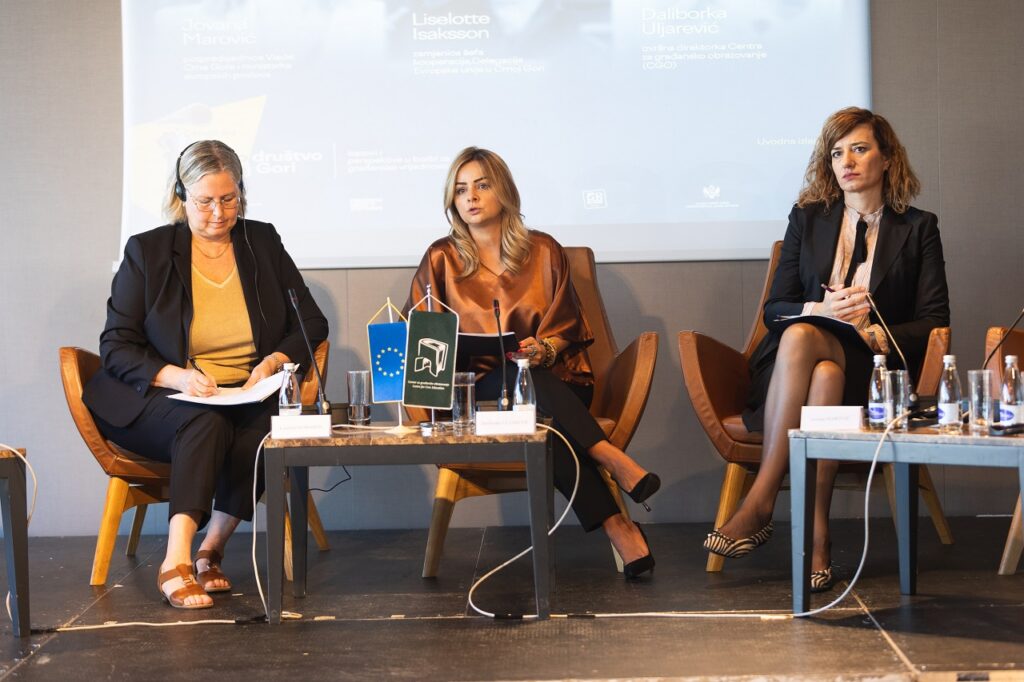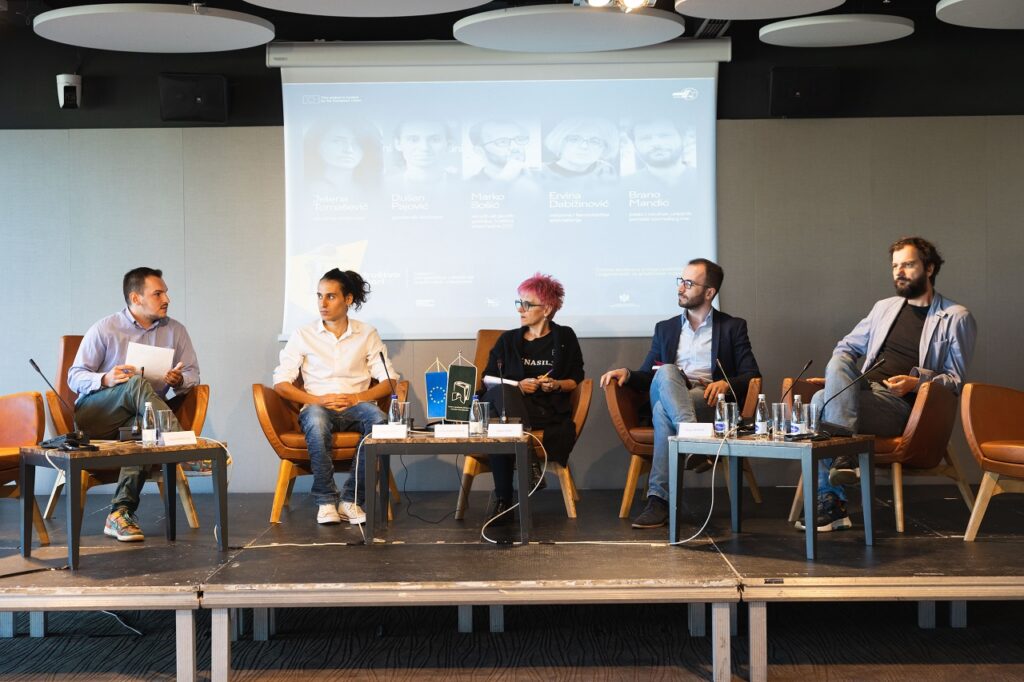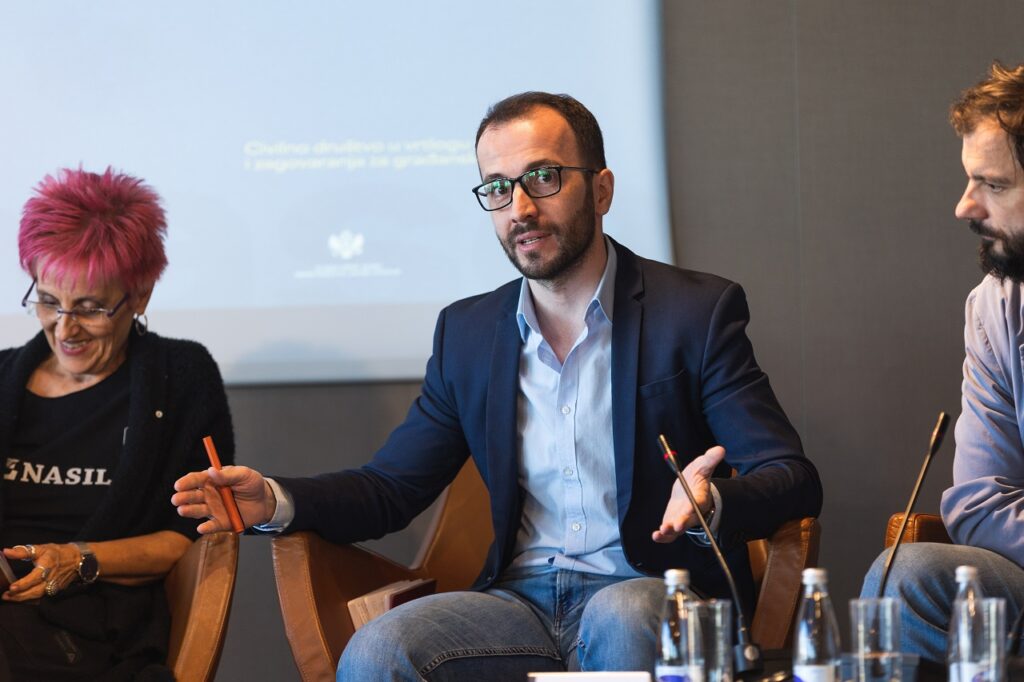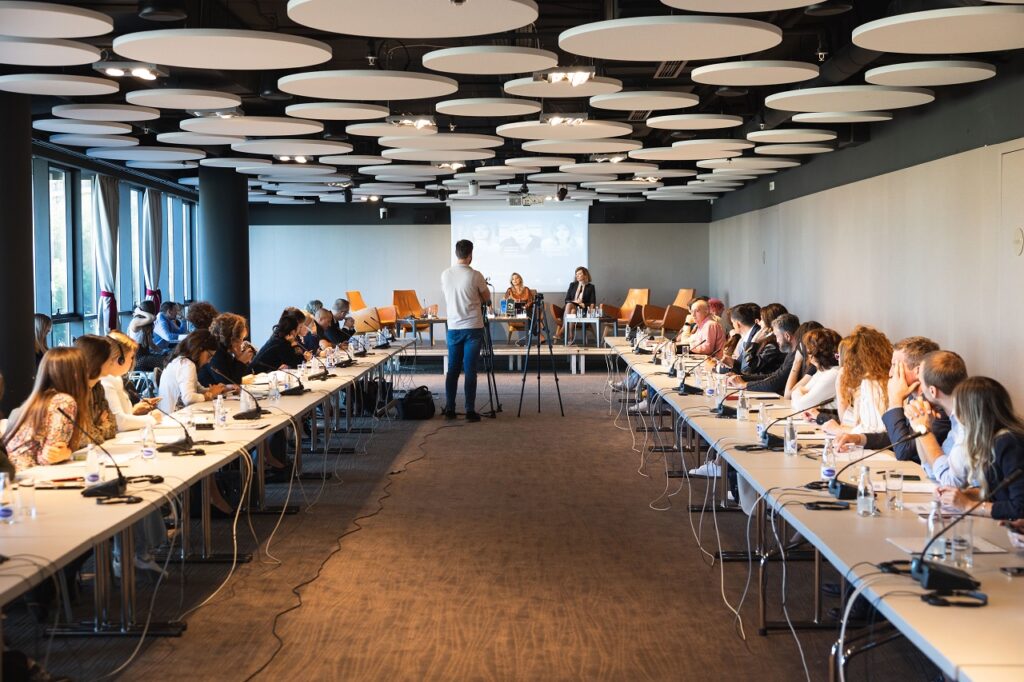Civic values in Montenegro are jeopardized, but the role of the critically oriented civil sector is crucially important and civil society remains a constructive partner and corrective factor in the process of democratization. We must create idealists, not careerists, which is often a problem in politics, but also in many other social segments, and NGOs should work in accordance with their principles and ideas, and not to meet anyone’s expectations, it was said during the first part of the event “Civil society in Montenegro – challenges and perspectives in the fight for civic values“, organised by the Centre for Civic Education (CCE) with partners, with the support of the European Union and co-financing of the Ministry of Public Administration.
Jovana Marović, Vice President of the Government of Montenegro and Minister of European Affairs, emphasized that “civil society is a constructive partner and corrective factor in the process of democratization of society.” She also said that “the experience of the change of government brings with it numerous challenges, but every government must ensure the participation of civil society in the creation of public policies and respect critics and suggestions”, emphasizing that a big step is made by the participation of NGOs in negotiating working groups, public discussions, working groups for legislative changes, inclusion in the Rule of Law Council, but that there is also always room for improvement. “In the MEA, we have renewed the membership of NGOs in negotiating working groups, and according to the suggestions of NGOs, we will try to simplify the application procedures for candidates. We also plan to fully open the work of the negotiating working groups to the public, so that all interested parties can attend and contribute. CSOs are still very interested in the negotiation process, saturation did not occur regardless of the length of its duration. The MEA is open to all NGO proposals and we are trying to make the negotiation process completely transparent”, concluded Marović.
“The EU gives great importance to civil society. An active civil society is a key element of any democratic system, it gives the voice to citizens and creates the link between citizens and government institutions.’’, pointed out Liselotte Isaksson, Deputy Head of Cooperation in the EU Delegation in Montenegro. She stated that the support of the EU and other donors is helpful, but it cannot solve everything, and that meaningful inclusion of civil society in decision-making processes requires genuine efforts from both sides – the government and the NGO sector. “In moments of political instability, you are the ones who bring people together, promoting tolerance and dialogue in these troublesome times. The EU has stood by your side and we have done a lot to help you grow and develop over the last years, including increasing our financial support through our pre-accession funds”, she stated. She added the development and functioning of civil society do not end with the accession of the state to the EU. “On the contrary, even then there will be a need for their activism, to continue to hold the government and institutions accountable, participate in the work of EU institutions and development of policies”, she said.
Daliborka Uljarević, executive director of the CCE, stressed the uncertain position of civil society in Montenegro as a long-lasting problem. “It is difficult as the basic – that civil society is the progressive core – has not been mastered and that without it there is no essential Europeanization. The government changed, but the attitude towards the critically oriented NGO sector did not. Today, there are only some new actors in power, and their mediums, who demonstrate the same bigotry, intolerance towards others and the different, which is especially expressed in relation to freedom of expression and basic human rights“, she said. “The role of genuine civil society is to be alert to violations of fundamental human rights and freedoms, cases of corruption, erosion of institutions, threats to civic values, etc. regardless of whom it comes from“, Uljarević was clear, saying that “we must all be persistent in our fields and remain committed to our goals and visions. Giving up those principles will be fertile ground for the development of retrograde frameworks that have nationalist and clerical entertainment content at their centre, and into which we must not fit. This does not mean that our ideas must be identical, but they must serve the general interest, be based on values, with respect for our differences and views on how we see the way to a better society where we live”. Uljarević emphasized the importance of local initiatives and movements, as well as individuals whose initiatives and struggles are important on many levels.
During the first panel, the focus was on civil society in the turmoil of the political crisis and advocacy for civic values.
Dušan Pajović, a civic activist, believes that civic values are jeopardized in Montenegro today. “We thought it was bad at the time of the RESIST protest, which I enthusiastically supported, and after which we only got replacements instead of changes. Litija protests brought polarization and a change of government. Not that Montenegro has not taken the path of quality change, but we also have signs that it is going backward”, he explained. “Civil values are jeopardized and whenever I think it can get worse, political elites always manage to surprise us”, he emphasized. Pajović believes that the NGO sector, leftists and activists are moving away from the political struggle, becoming disorganized, and their statements are transmitted abbreviated or taken out of context. “Civil power exists. However, in fear of criticism, in fear that someone will label them a neoliberal, a Chetnik or a Komita, a part of people chooses passivity, which defeats the struggle for change“, he warned. “We have to create idealists, not careerists, which is often a problem in politics, but also in many other social segments. Democracy is not voting for politicians who then do what they want, civil streams should try to ensure the care of citizens”, said Pajović.
Marko Sošić, a public policy researcher at the Institute Alternative (IA), commenting on the position of the NGO sector, emphasized the financing of the NGO sector and the problems that arise from uncertainties in the budget and the allocation of less money than legally prescribed. “Besides, the problem is who gets the money, in which way the allocation is decided at the calls, and in general which ministries have calls because some have been organizing them for years. Whom it supports, the state sends a message that it wants an anonymous or underdeveloped or civil sector that deals with communication activities for their public policies“, explained Sošić. “Civil society should continue its work and be corrective to this and future governments, and try to give a voice to those who do not have one, who are forgotten or invisible in the political game”, he said. Furthermore, Sošić assessed that there is an extensive campaign against the civil sector by some political actors. “It is usually that part of the political spectrum that, when in power, does not tolerate any criticism and criticizes NGOs.” Also, the tyranny of expectations towards NGOs to be everywhere, in every place, to advertise everything that someone in society thinks is important is obvious. In that race, NGOs should work in accordance with their principles and ideas, and not live up to anyone’s expectations“, underlines Sošić.
Ervina Dabižinović, peace and feminist activist, pointed out that the current state of affairs has two teams that claim that no one can be in their place. “Civil society has been destroyed. We constantly repeat the situation – the goals are the same, but the situations are repeated“, she said, adding that citizens are demotivated. “What needs to be said to the people in the position now is that they have to leave“, she says. “Political elites blocked the system and they are trading. And society is devastated and the little baggage that has been built up over the years is called into question. All initiatives are superfluous to the system. The crisis is deep and it is uncertain how it will end. Hopefully not with weapons“, said Dabižinović. The recent idea that leading positions in the executive and legislative power should be taken over by women, she comments as instrumentalization. “It represents caricaturing of a serious issue behind women’s backs. It is an attempt to caricature an important issue and concept of women’s government, about which neither the Women’s Political Club nor their party friends know anything. It looked like in an old Yugoslav movie when Katica is working and she gets involved in everything, even though she is only a hygienist“, she says.
“Our society has gone further to the extreme”, believes Brano Mandić, writer and journalist, editor of the web portal normalizuj.me, adding that “there is a need for reflection, which I always do with my actions. However, in a society where the political content has been emptied and reduced to slogans, the reflection never actually takes place“. Mandić believes that civil society has been mired in laziness and self-interest for years, and emphasizes the need for more creativity and investment in creative responses to the hatred that is beginning to disturb us on a deeper level. “Directing all possible resources to individuals who will come forward and be encouraged to speak on their behalf would be a step forward,” he said. Mandić considers that “we should go more towards the citizens, the earthly problems that we have and that we recognize as essential in life“. When it comes to populism, which is endemic, Mandić referred to the media and their role in it. “The media does nothing to prevent populism, the awful humiliation of intelligence and the truth, but makes profit and connections with political currents in order to survive,” he concludes.
The round table gathered over 70 participants from institutions, non-governmental organizations and international organizations.
The round table is organized as part of the project CSOs in Montenegro – from basic services to policy shaping – M’BASE implemented by the CCE, in partnership with the German Friedrich Ebert Stiftung (FES), NGO Center for the Protection and Research of Birds (CZIP) and Politikon Network, in cooperation with the Ministry of Public Administration and Ministry of European Affairs of the Government of Montenegro. The project is financed by the European Union and co-financed by the Ministry of Public Administration.
Maja Marinović, Programe associate




